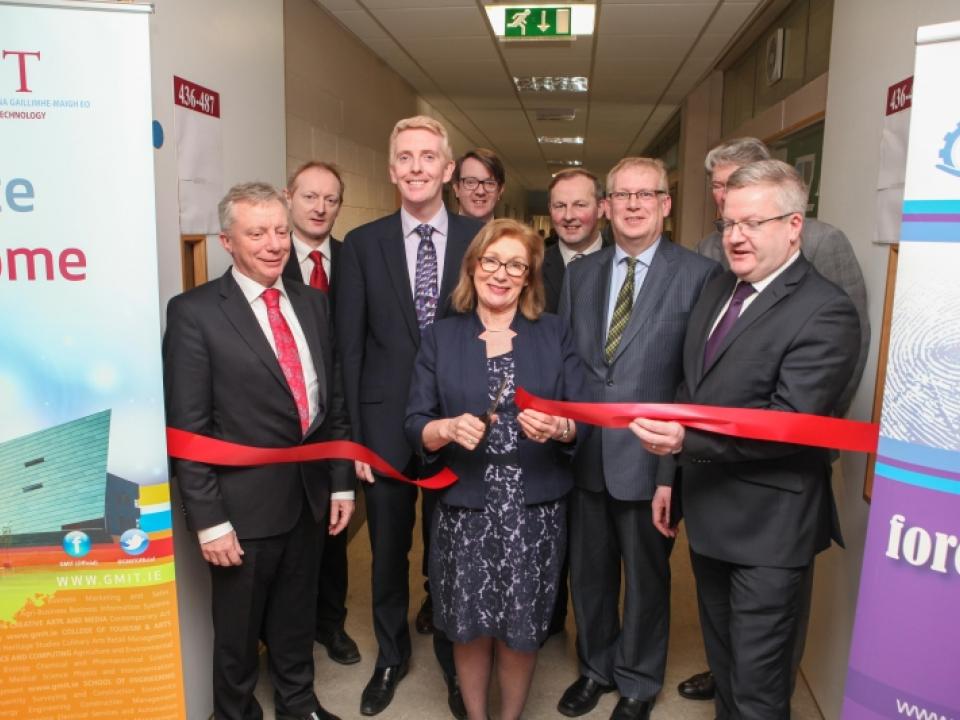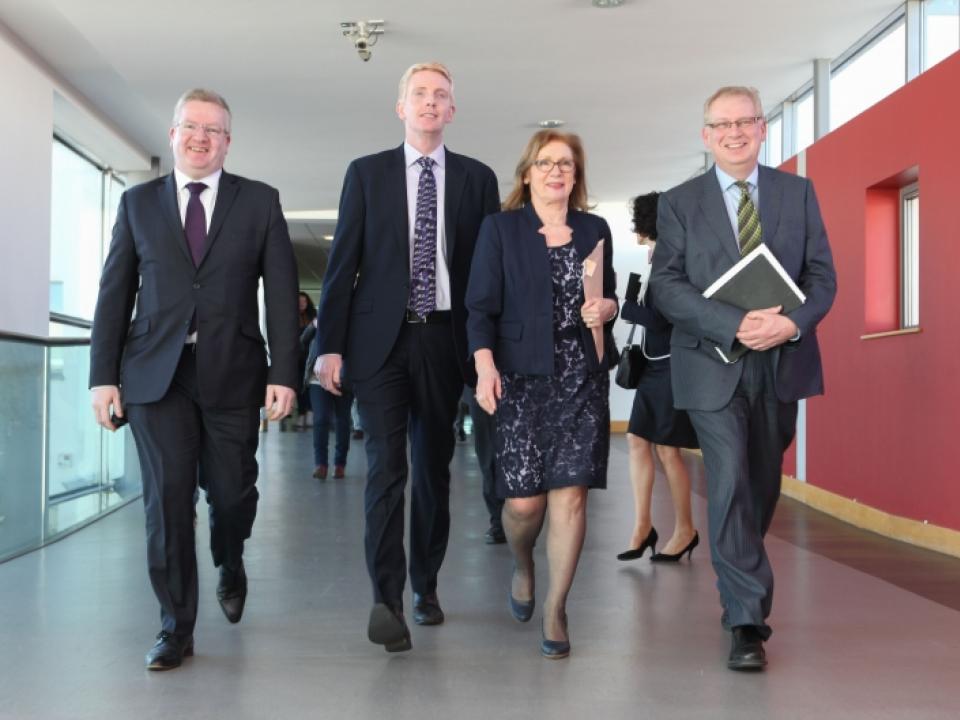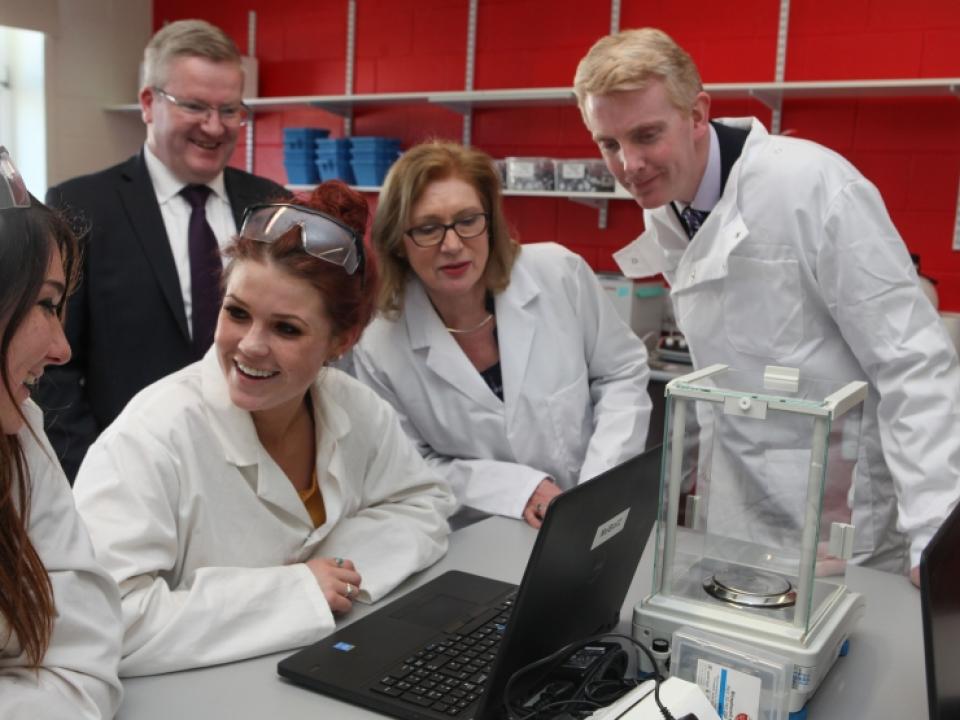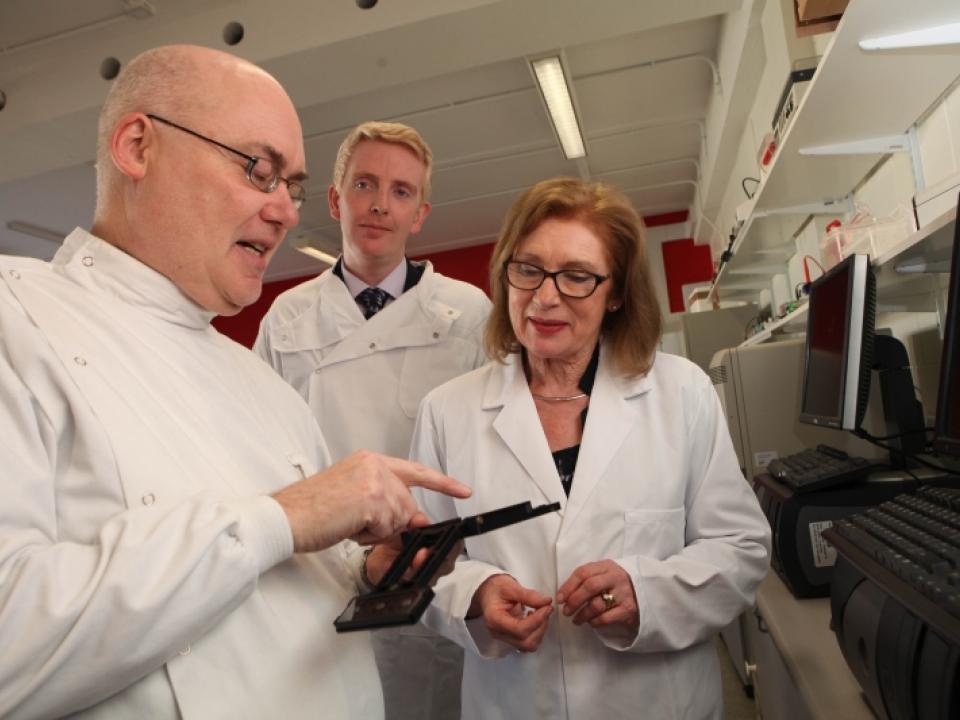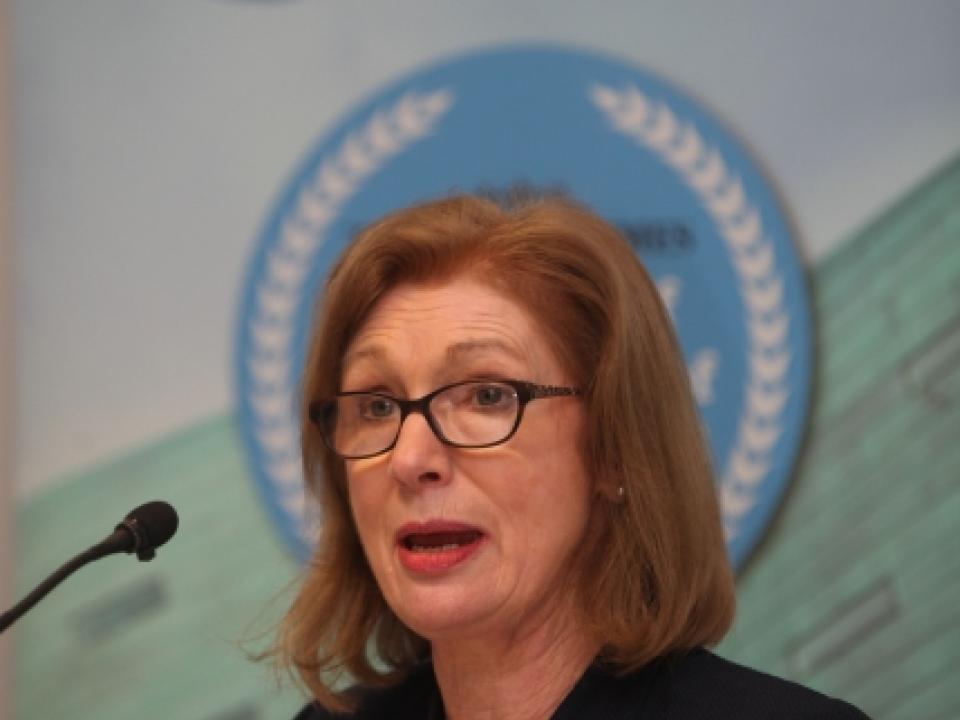Education Minister opens newly refurbished Science & Computing labs
New labs will cater for the growing numbers of students in the School of Science
The Minister for Education & Skills, Jan O’Sullivan, yesterday (Monday 15 February) formally opened a suite of new and refurbished science and computing laboratories at GMIT’s Galway (Dublin Road) campus.
The laboratories were established to cater for the growing numbers of students in Science and Computing programmes on campus, and comprise two new laboratories to accommodate medical science and molecular biology classes, one new laboratory to accommodate wireless (bring your own device) computing classes, flood wiring in a further six laboratories to enable faster processing times, and an extension of a further computing laboratory.
The refurbishment and upgrade work was completed at the beginning of this academic year (Sept 2015) at an estimated cost of €775,000, and the immediate return has resulted in the following:
Additional intake of 45 extra Science students into first year
New Springboard programme at Level 7 in Computing (Web Technology and Programming)
Freeing up of capacity in other programmes to cope with increased numbers in Years 2, 3 and 4
Increase in undergraduate output
Improved infrastructure for undergraduate computing students
Minister O’Sullivan, accompanied by Galway West Labour Deputy Derek Nolan and Labour City Councillors Niall McNelis and Billy Cameron, were given a tour of the new facilities by Chair of the GMIT Governing Body Des Mahon, GMIT President Dr Fergal Barry and senior management.
In her speech to students and staff, Minister O’Sullivan praised the college for its work in attracting students to study Science Technology Engineering and Maths (STEM) related programmes in GMIT.
“GMIT has recognised the importance to this country of producing top class Science and Computing graduates. I applaud the fact that you had the foresight to improve and develop the necessary infrastructure to deliver on your objectives. You demonstrated this through your response to increasing numbers of students indicating an interest in this area, prompting to an update on laboratory utilisation across the Galway Campus with the result that the project I am here to open today was made possible. I would like to thank everyone involved in the procurement and construction of these facilities in that context.”
“Despite operating against a backdrop of financial constraint in recent years, I was delighted to be in a position last year to approve the expenditure of €600,000 of capital funding from my Department towards this project. This has proved to be an excellent investment as the Institute has been in a position to accept an additional intake of 45 extra Science students in the current academic year as well as offering a new Springboard programme at Level 7 in Computing.”
“This investment is not only an investment in bricks and mortar but an investment in our young people who are the scientists and computing experts of tomorrow. By enriching their learning experience, GMIT is equipping them with the necessary expertise to be successful in their chosen field and to make a valuable contribution to society. You have a strong tradition in producing Science and Computing graduates who are competent, erudite and highly sought after in the professional world. I am certain that the values, hard work and innovation you espouse will ensure that this tradition will continue.”
GMIT President, Dr Fergal Barry, thanked Minister O’Sullivan for opening the new Science and Computing Laboratories. “We also thank you Minister for the opportunity earlier today to brief you on our exciting campus development plans as we prepare for increasing participation in further and higher education and an expected increase in the student population of GMIT by almost 2000 students in the decade ahead.”
“Strategic investment in GMIT will be critical to this development and to the development of a well-functioning city region as a location of attracting additional foreign direct investment and supporting the development and growth of indigenous industry. We look forward to an increasing focus on investment in public service and third level education by the next Government, particularly investment in the Institute of Technology Sector.”
“The introduction of a borrowing framework and a mechanism for the Institute of Technology sector to evolve on a par with our international counterparts is now critically important and we applaud your work Minister and that of your officials in developing the Draft Technological University Bill providing the instrument and mechanism for Institutes of Technology to scale, to build financial resilience and to compete meaningfully in research and to internationalise our curriculum. We look forward to the finalisation of the Technological Universities Bill under the next Government and the signing into law of the new Legislation for the Technological Higher Education Sector that will facilitate the development of a Technological University for the West/North West of Ireland through the collaborative efforts of Institute of Technology Sligo, Letterkenny Institute of Technology and Galway-Mayo Institute of Technology. In 2012, GMIT formed a strategic partnership (the Connacht-Ulster Alliance - CUA) with Letterkenny Institute of Technology and Institute of Technology, Sligo. We are delighted that in October 2015, the Minister approved the CUA to proceed to the next stage of the process of building a Technological University for the West/North-West of Ireland.”
“A strong diverse Technological University with a focus on regional enterprise and innovation will have a positive impact on the attractiveness of the region as a location for investment and for new companies to innovate and grow.”
“Every year, some 1200 students go on work placement from GMIT. 65% of GMIT students graduate with a 1st or 2nd class honours degree and 92 % of some 2000 GMIT graduates have a job or go on to further study within nine months of graduation. So the future is bright for students who come to study at GMIT. 14 % of our Level 8 graduates go on to further study at Masters or PhD level, which is consistent with the norms of the university sector.
“Plans are at an advanced stage for the development of additional incubation space here at our Dublin Road Campus and we are ambitious to see incubation facilities developed at all GMIT campuses in the fullness of time subject to securing the necessary investment. Our Innovation Hubs have nurtured through incubation facilities and a range of enterprise support programmes over 400 start-up companies that have secured some €67M of Venture Capital Investment. The current occupancy level of the incubators has been at 100% for the last 18 months with clear evidence of entrepreneurial demand for additional space. The proposed extension of the Galway incubation facilities will serve to ensure that the needs of regional start-ups are better served resulting in a more profound economic impact in the region including the creation of additional jobs, higher seed and venture investment, as well as greater revenue generation.”
“I want to thank you Minister, your officials and your Government for your foresight and for your investments to date in GMIT. Again, I would like to acknowledge the efforts made by Deputy Derek Nolan and Cllr Neil McNelis in securing the investment in our New Science and Computing Laboratories.”
GMIT’s School of Science and Computing offers 15 full-time and 12 part-time programmes in three departments: Dept of Biopharmaceutical and Medical Science, Dept of Computer Science and Applied Physics, and Dept of Natural Sciences.
Programmes (L7 bachelor degrees and L8 honours degrees) have a strong emphasis on practicals, projects and placement. The majority of students want to progress to a Level 8 qualification either through the ab initio route or a one-year add-on after their ordinary degree. The School also offers programme under the HEA funded Government Springboard initiative with emphasis on skills relevant to the region, in areas such as computing, medical device technology, entrepreneurship. These courses are at L6 (Higher Cert) and Masters (L9). See all programme: www.gmit.ie/science (right hand panel)
